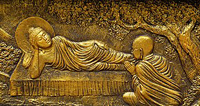Notes on counselling
Apropos the heaviness factor in relaxation
Abstract
One can only relax that part of the body that has been invested with consciousness and joy. If that part can be identified, the subject can be trained to relax the other parts of the body.
Progressive muscular relaxation is a unique technique for stress and anxiety. As one relaxes, the body should initially feel heavy and warm and then one feels a sense of weightlessness. There are variants of relaxation exercises where also the same sequence of heaviness followed by the feeling of weightlessness occurs (for example subjects may be told to feel the air of the ceiling fan touching their whole body and then suggested to feel the heaviness in the body).
It is important to feel the heaviness in a sequential manner as the body starts relaxing from one part to progress to other parts. And it is an interesting phenomenon for it is not only therapeutically beneficial but is a pointer to the zone where one has to work both from the psychological perspective and body-consciousness. One can feel the heaviness spontaneously only in that part of the body that has been dealt with consciously and yet without any anxiety or stress!
For example, someone who had played football with great enthusiasm or used to have dancing lessons would spontaneously feel the heaviness in the legs even if one had left off playing football or practising dancing years before (for the body per se has a unique memory!). One who is happy to do computer work or draw pictures or practice boxing would at first feel the heaviness in the hands. Teachers who love their profession and are not stressed usually feel the heaviness in the heads. The therapist should tell the subject to first concentrate on the area where the heaviness is spontaneously felt and then extend the feeling of heaviness to gradually spread over the rest of the body. Only when the heaviness can be equally felt all over the body can one say that an ideal state of relaxation has been obtained. Of course to consolidate the gain one must then practise exercises for widening the consciousness.
If done properly but the inability to feel the heaviness during relaxation is still there, it points to the part of the body or the organ where therapeutic activity has to be specially focused. These two cases illustrate this phenomenon in a logical way:
I.S is a 20-year-old young man who had a major cardiac surgery at the age of 13 years. Though his cardiac problem got corrected, his anxiety and panic-attacks became chronic and actually worsened over time. He could not afford to travel outside his home for anticipatory fear about impending panic attacks. As a result, he got disconnected from friends and also his football game which he loved. He excelled in drawing figures but he mostly liked to draw sketches of muscular icons like Spiderman or ferocious figures like Dracula, which was obviously compensating his masculinity that was suffering a recoil due to inability to enjoy life (for he regretted being unable to find a fiancée!). Initially his panic attacks would subside on sublingual doses of Clonazepam but that had stopped benefiting him after a while.
He was taught to relax and was being instructed to methodically feel the heaviness all over the body when he suddenly exclaimed in the midst of one session that whenever he felt anxiety or had the panic attacks, he felt a great lightness in his chest which actually upset him for he felt that the feeling of lightness at that point was preventing the feeling of stability, consolidation and concreteness needed to enhance his confidence and instil a sense of security. During the session, he could feel the heaviness in his legs (as he had played football extensively in his pre-operative days) but could not feel it in his chest; he also could not feel that his breathing was getting heavy if it was suggested to feel so.
It was explained to him that he had to practise relaxation diligently till he could feel the heaviness in his chest and his breathing was heavy, for only then would he be able to ward off these panic-attacks. But it was also decided to address his emotional issues through a counselling programme and work on his heart cakra so that his emotional being could free itself from the blockages of insecurity.
A distinguished eye-surgeon had a sudden attack of anxiety neurosis in the middle of his brilliant professional career after one of his patients underwent complications during surgery but which were actually resolved without much post-operative problems. Yet it is the nature of anxiety that at times when it starts from real issues, it continues to be active even if the precipitating factors have been resolved. Of course this depends on background factors. In this case the surgeon had strong perfectionist traits and was a workaholic, had never taken time off his work to pursue worthwhile leisure that brings completeness in life and never had time for any introspection needed for his personal growth. He was obsessed with his surgical skills, which had been excellently developed. No wonder the pent-up stress found a point of release over a trivial issue. When he was undergoing a relaxation programme, he could feel the heaviness all over the body except the fingers of both the hands. He could relax all parts of the body except the fingers, for his whole consciousness had been invested in his fingers for fine surgery.
We have mentioned that one can relax those parts of the body that have been consciously dealt with. Why then was the surgeon not being able to relax his fingers? This is because when one consciously deals with a part of the body, one has to do it with spontaneous joy, for Consciousness per se is not only Knowledge and Power but also a formation of Bliss or Ānanda. In this case, the surgeon always had a high performance anxiety and always took his performance seriously. But actually one can also not lose seriousness if one can afford to be casual with full faith in the Supreme Ideal.
The surgeon was not only instructed to practise relaxation till he could relax his fingers but also advised to change his world-view, do some introspection and cultivate creative habits with his hands, like playing music for himself, anything which were not linked to any professional gain.
Our aim in therapy should be Whole-Person health for we do not live in isolated compartments, but in the flux of Consciousness. In therapy, a small indication can point to a greater task that has to be achieved. An experienced clinician must not miss any cue for this simple inability to feel the heaviness during relaxation, which could lead to framing a broader therapeutic outlook.
Dr. Soumitra Basu, a practising psychiatrist and member of SAIIIHR, is the Director of a school of psychology, Integral Yoga Psychology. He is also one of the editors of NAMAH.
Share with us (Comments,contributions,opinions)
When reproducing this feature, please credit NAMAH,and give the byline. Please send us cuttings.



